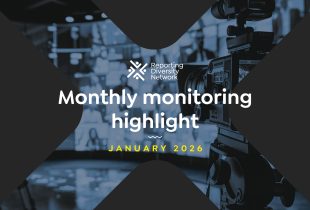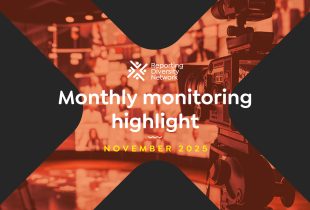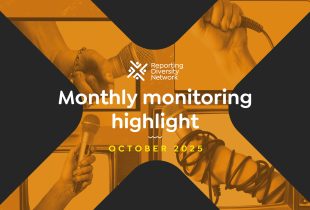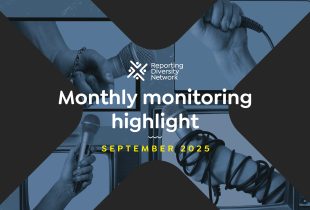North Macedonia

Monthly Highlights January: Sensationalism, Sexism and Nationalism
During January, the RDN monitoring team identified a range of hateful narratives and discourse driven by sensationalistic reporting, sexism and misogyny, nationalism and ethnic hatred. Sensationalistic and unprofessional reporting in Albania and Bosnia and Herzegovina Albanian media reported extensively on a serious case of sexual abuse involving a 12-year-old girl who was found to be approximately 22 weeks pregnant following a medical …

Monthly Highlights December
During December, the RDN monitoring team identified a range of hateful narratives and discourse driven by anti-LGBTQI+ discourse, sexism alongside the glorification of war criminals, the publication of unverified information and the normalisation of gender-basedviolence. Anti-LGBTQI+ discourse in Albania In two separate television appearances in December, lawyer Zace Islami made a series of extreme anti-LGBTQ+ statements on national broadcasters …

Monthly Highlights November: Hate speech, Threats and Sensationalism
During November, the RDN monitoring team identified a range of hateful narratives and discourse driven by hateful and harmful political speech, hate speech against journalists and sensationalistic reporting. Hateful and harmful speech in Albanian parliament During the parliamentary session debating the newly adopted Gender Equality Law, opposition leader Sali Berisha made a series of homophobic …

Troll of the Month: TV Klan Kosova
The Balkan Troll of the Month is an individual, a group of individuals or a media outlet that spreads hate based on gender, ethnicity, religion, or other diversity categories. The Balkan Troll is selected based on hate speech incidents identified across the Western Balkan region. On the evening of November 5, 25-year-old Daorsa Spahija from …

The State(s), the Church(es), and the Nationalism
In the Western Balkans, the line between political power and religious authority is increasingly blurred. From Belgrade to Ppogorica to Skopje, churches do more than tend to faith. Religious leaders preserve historical narratives, shape national identity, and legitimise state power. Whether by glorifying convicted war criminals or framing geopolitical struggles as spiritual battles, religious leaders …

Monthly Highlights October: ethnic hatred, sensationalism, unprofessional reporting, sexism, and political motivations
During October, the RDN monitoring team identified a range of hateful narratives and discourse driven by ethnic hatred, sensationalism, unprofessional reporting, sexism, and political motivations. Ethnic hatred and violence in Montenegro Between 25 and 28 October 2025, a series of violent and xenophobic incidents unfolded in Montenegro following an attack in Podgorica’s Zabjelo neighborhood. Late …

Monthly Highlights September: glorification of war criminals, ethnic hatred, misinformation and anti-LGBTQI+ rhetoric
During the month of September, the RDN monitoring team detected a range of hateful narratives and discourse fuelled by sexism and glorification of war criminals alongside anti-LGBTQI+ rhetoric, misinformation and ethnic hate speech. Sexism and glorification of war criminals in Bosnia and Herzegovina The cultural event “Kočićev zbor” (Kočić’s Assembly), held on August 29, 30, …

Breaking Words, Building Bridges: Regional Experts Warn Against Rising Polarisation in the Balkans
Hate speech in the Western Balkans is becoming more complex, layered, and increasingly used as a political weapon, according to new media monitoring reports presented at the regional conference Breaking Words, Building Bridges: Responses to Polarisation in the Western Balkans held in Belgrade, Serbia. The Reporting Diversity Network (RDN) showcased its third set of reports …

Monthly Highlights August: Ethnic discrimination, religious hate and hatred towards politicians and journalists
During the month of August, the RDN monitoring team detected a range of hateful narratives and discourse fuelled by religious hate, ethical tensions and hatred towards politicians and journalists. Religious hate in Bosnia and Herzegovina Sanin Musa, leader of the “Faith. People. State.” movement and president of the Bosnian People’s Party, announced the arrival of …
